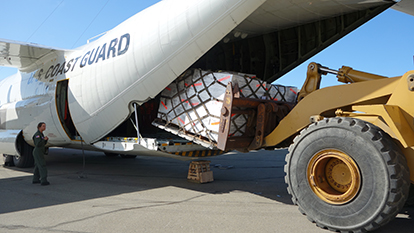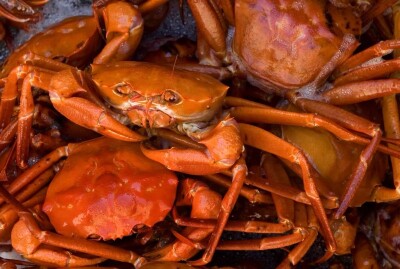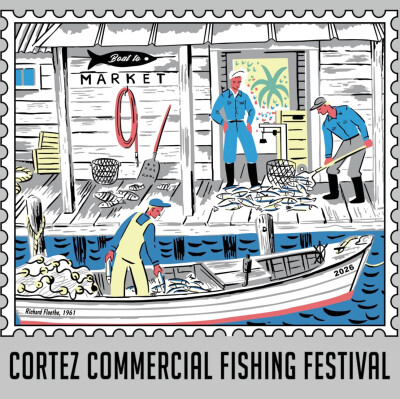SeaShare, a non-profit organization that facilitates donations of seafood to feed the hungry, announced on Wednesday, July 29 that it had partnered up with Alaska seafood companies, freight companies and the Coast Guard, to coordinate the donation and delivery of 21,000 pounds of halibut to remote villages in western Alaska.
On Wednesday, the Coast Guard loaded 21,000 pounds of donated halibut on its C130 airplane in Kodiak and made the 634-mile flight to Nome.
A Coast Guard team loads 21,000 pounds of donated halibut on to its C130 airplane in Kodiak. SeaShare photo.There, 10,000 pounds of halibut were offloaded and distributed by Kawerak, Inc., a tribal non-profit consortium representing the 20 federally recognized tribes in the Bering Strait region.
The halibut was sent to the villages of Savoonga, Gambell, Diomede and Wales, which have been severely impacted by the low walrus harvests this spring. Residents of these villages are heavily reliant on walrus meat to fill their freezers and they will receive boxes of frozen halibut to supplement their food supply.
From Nome, the Coast Guard plane continued on to Kotzebue where an additional 11,000 pounds of halibut was offloaded for residents of that region.
Maniilaq Association, a non-profit that provides health, tribal and social services to 12 communities in northwestern Alaska, assisted with the distribution of the halibut. In addition to Kotzebue, the halibut will also be delivered to residents in the villages of Ambler, Shungnak, Kobuk, Deering, Kivalina, Noatak, Busckland, Noorvik, Kiana and Selawik.
The halibut processing was donated by many Alaska seafood companies, including Ocean Beauty Seafoods and North Pacific Seafoods in Kodiak. In addition the Coast Guard’s donation of transportation, Bering Air, Lynden Freight, Erickson Helicopters and Ravn Alaska donated freight to move halibut to the villages.
Jim Harmon, SeaShare’s executive director thanked all the donors and volunteers for their help in completing this complicated delivery of much needed seafood. “This is a great example of our seafood partners working with local communities and native corporations to address hunger,” he said.
Based on an average four-ounce portion, SeaShare has donated more than 200 million servings of seafood in the past 20 years, much of it coming from Alaska with the help of its network of donors.







